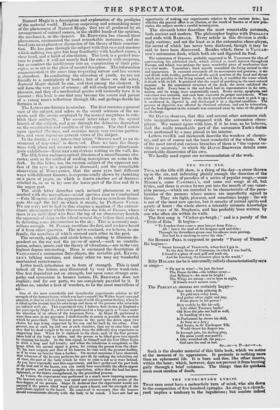THE BLUE BAG.
THIS, as the title will show, is a thing of the day—a straw thrown up in the air, and indicating plainly enough the direction of the wind. It consists of' parodies of a series of popular songs,—some MOORE'S, some CAMPBELL'S, and some not songs at all, but fables, and there is even a hymn put into the mouth of one vener- able person,—which are intended to be characteristic of the pecu.- liarities of the persons whose names are imperfectly signed to them. They are light, pleasant, and sometimes happy : the wit is not of the most rare species, but it smacks of animal spirits and gaiety of heart : the whole shows a tolerably intimate knowledge of the ways of St. Stephen's, and has probably been written by one who often sits within its walls.
The first song is " Croker-go-bragh ; " and is a parody of the "Exile of Erin. It begins- " To London there came a poor lawyer from Erin-
Ah ! heavy the mud on his brogues ould and thin ; Through his threadbare green coat his elbows were peering, Nor had he a stocking to cover his shin."
Sir ROBERT PEEL iS supposed to parody "Fanny of Timmol.*, He begins- " Sweet borough of Tamworth, when first I got in
To the dear House of Commons, in which I was hurfd,
I found it a place of such pelf and such sin
And for humbug, the funniest place in die world."
Billy HOLMES (as he is universally called) characteristically says or sings-
" Fly not to wine!—'tis just the hour The House divides—the lobbies scour— And Bellamy's—for once be bright ! The Whigs are strong—we're bent to night, If friends won't muster soon."
The PERCEVAL stanzas are certainly happy—
How doth a little pilfering B. To gold turn every hour, And gather silver night and day, From places in his power !
How craftily he fills his cell, Like oldest Treasury hacks! Old Rose did jobs not half so well, In handling of a tax.
In Parliament he shows his skill,
As busy as a Jew ; And Isaacs, in th' Exchequer TM, Would thrust his fingers too.
In borough jobs, his darling play, His pious youth was pass'd;
A title, wretched elf; the pay,—
God save his soul at last.
Such is the slender material of this little book, which we notice at the moment of its appearance. It pretends to nothing more than an ephemeral life. It is born and dies, like other insects, within the hour; which, however, does not prevent it from buzzing gaily through a brief existence. The things that die quickest seem most careless of death.


























 Previous page
Previous page